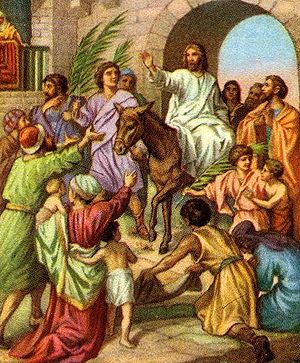Day 35, Monday, April 2, 2012

We’re in the last week of Lent and we should be excited about celebrating soon Easter—Jesus’ victory over sin and death. However, there’s a series of things that Jesus did during His last week on earth that should teach us several spiritual lessons. Today, I’m reminded of a 1500 year old Celtic missionary song—Be Thou My Vision:
“Riches I heed not, nor man’s empty praise: be thou mine inheritance now and always;
be thou and thou only the first in my heart; O Sovereign of heaven, my treasure thou art.”
Perhaps this prayer was inspired by Jesus’ attitude to the reaction of Jewish people particularly during His triumphant entry into Jerusalem (see Matthew 21:1-17, Luke 19: 28-44 ). People were ecstatic and shouted with joy their hosannas and halleluiahs. They spread their clothes and palm branches on Jesus’ way and appeared to hail Him as the king of Israel. However, there’s a little but meaningful verse in Matthew 21: 17 (NIV): “And he left them and went out of the city to Bethany, where he spent the night.” Jesus was unmoved by the praises and popularity and quickly withdrew from it all, as He fixed His eyes upon the cross. He would not let empty human praises, and hollow popularity among them come in the way of His clear vision and His mission. He would not trust people’s praises, as He knew that in just a few days these very people would also be joining the chorus, “crucify him, crucify him!” Therefore, He kept His eyes fixed on the sovereign God and the calling He had received from His Father. No worldly gain or calling could divert His attention from fulfilling what God had called Him to do for the salvation of humanity.
When we hear people praising us how do we feel? When we get a little popularity among our folks, do we allow it to go to our heads and sit there? Where are our eyes fixed today? What is our vision? If God is not the center of our lives, may be, it’s time to pray the Celtic prayer and mean it:
“Riches I heed not, nor man’s empty praise: be thou mine inheritance now and always;
be thou and thou only the first in my heart; O Sovereign of heaven, my treasure thou art.” Amen.
Related articles
- Sunday Sermon: Who is Jesus to you? (jimkane.wordpress.com)

